The Mistakes Presentation
Also Known As /b/ Presents
The good people of 4chan /b/ have been diligently collecting the more graphic
examples of mistakes people have made.
While ostensibly for lulz, documented mistakes can provide us with valuable information about
the world around us.
In attempting to categorize the evidence,
mistakes seem to break down into two major categories: expected and unexpected.
Expected Futures
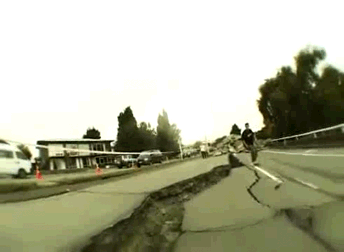
People seem to balance risk and reward, and sometimes they lose.
Skaters know that this happens all the time and that risk seems illusory:
Concentrating on the apparent risk means you can screw up elsewhere.
Counter-intuitively, sometimes the run-up or run-down to a trick seems to be the riskiest part.
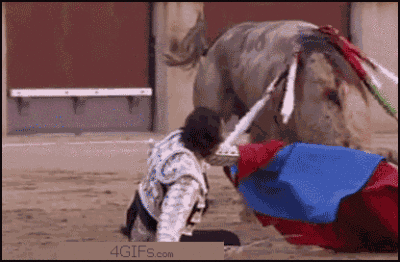 Likewise, bull fighters face the same issues.
They step into the ring knowing that either they will destroy a bull,
or the bull will destroy them.
Likewise, bull fighters face the same issues.
They step into the ring knowing that either they will destroy a bull,
or the bull will destroy them.
Since the people involved expect these futures,
it seems difficult to call them mistakes.
They took their chances and things just turned out poorly.
When is it, then, that truly Unexpected things occur?
Unexpected Futures
 For children, the world has a seemingly unending supply of Unexpected.
For children, the world has a seemingly unending supply of Unexpected.
With a drastically limited amount of attention and experience, they often
pay attention to the wrong thing.
 Even when paying attention to the right thing,
children just try things and generally seem to trust that what they're doing won't be problematic.
Even when paying attention to the right thing,
children just try things and generally seem to trust that what they're doing won't be problematic.
* Note that watching and recording seem quite different.
The act of recording appears to turn one's brain off.
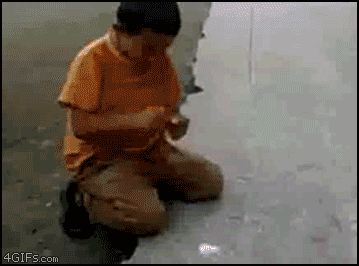 Children trust that consequences won't last for the rest of their lives.
Children trust that consequences won't last for the rest of their lives.

The surprise of the Unexpected can be found as late as adolescence.

Or even slightly later.
By adulthood, though, we expect people to be aware of their surroundings
and to have a fairly good notion of their actions' impact.
So why do we keep making mistakes?
They appear to be caused primarily by:
- Miscommunication
- Loss of Control
- Incremental Forces
- Negotiation
- Knowledge Gaps
Miscommunication
 Given a gesture of help or some communication, we can fall into the trap
of assuming that we have sync'd on all the relevant details.
Given a gesture of help or some communication, we can fall into the trap
of assuming that we have sync'd on all the relevant details.
We have lots of coordination systems: from something as simple as "on 3. 1, 2, 3!".
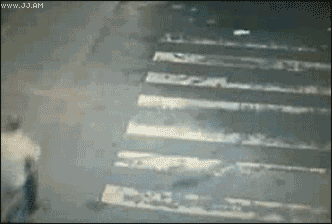
To coordination systems as complex as traffic intersections,
we rely on them to keep things working.
And they do, for the most part.
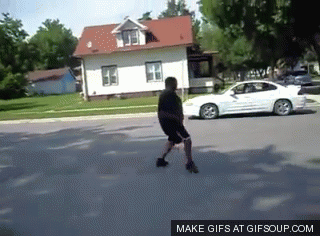
However, people occasionally believe that everyone
else is also paying attention.
Despite much evidence to the contrary.
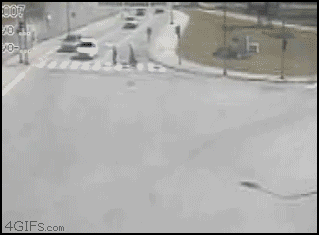
So some people bike in the street, assuming that they'll be safe.
Or that they'll be able to get out of the way in time.
The problem is that cars have the element of surprise and can be quite quick.
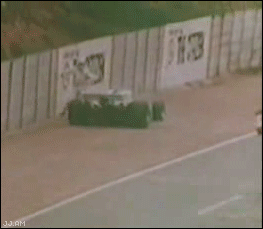
Really quick.
And we don't have much experience with those relative speed differentials.
Loss of Control
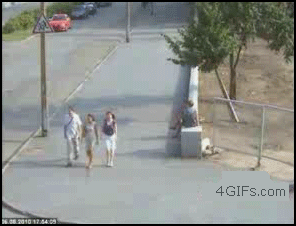
It's also the case that while we may be in control, others may most
definitely not be.
* Note that moving to the side by a meter was the key difference.
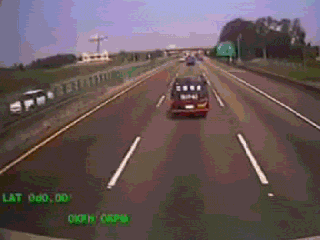
While we rely on complex systems to maintain our control,
we may not realize when our controls are approaching failure.
Many critical systems can fail quite abruptly, such as a braking system.
* Most braking systems fail incorrectly in that they fail "open" so drivers
end up with no brakes. They should fail "closed";
however, that's another engineering trade-off of cost vs benefit.
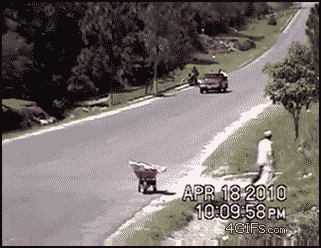
Additional weight may cause failure, and may be made worse when the driver is not
used to the vehicle at that weight.
Incremental Forces

In many situations, we can increase the forces involved
along some vector and be fine.
However, we don't seem to have an innate understanding of
how the other forces are changing.

Or where the breaking points are.
Negotiation
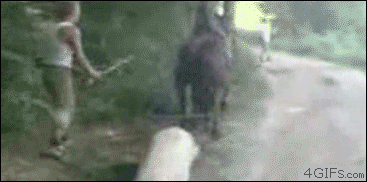
We can push too far in what we want, without seeing
that the other side may retaliate.

Cultures may clash and argument resolution styles may be different.
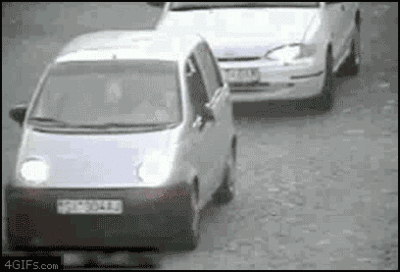
Or people might just snap.
Knowledge Gaps
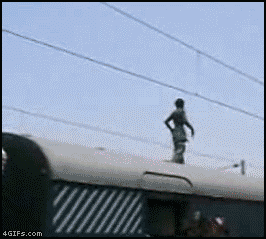
Ultimately, all mistakes reduce to not knowing enough.
Even as an adult, we may be lacking critical knowledge.
We may be aware of the power needed to run a train.
And not aware that the wires above the train actually power the train.
* We also seem to differ across time and situations in our abilities to apply knowledge.
See the rather large wikipedia list of
cognitive biases
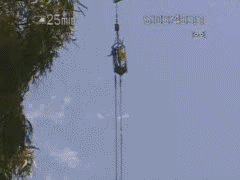
All of these classes of mistakes can compound.
We may not know that crocodiles can lunge and are native to an area.
Preoccupied with the present danger of a bungee cord failing,
we fail to verify that the landing site is safe.
* Note that this video is fake, just like every one of the previous videos.
What Can We Do?
Be aware of the forces around us.
That's it?
Yes. Now as they say in /b/, GTFO.
 People seem to balance risk and reward, and sometimes they lose.
People seem to balance risk and reward, and sometimes they lose.
 Likewise, bull fighters face the same issues.
They step into the ring knowing that either they will destroy a bull,
or the bull will destroy them.
Likewise, bull fighters face the same issues.
They step into the ring knowing that either they will destroy a bull,
or the bull will destroy them.
 For children, the world has a seemingly unending supply of Unexpected.
For children, the world has a seemingly unending supply of Unexpected.
 Even when paying attention to the right thing,
children just try things and generally seem to trust that what they're doing won't be problematic.
Even when paying attention to the right thing,
children just try things and generally seem to trust that what they're doing won't be problematic.
 Children trust that consequences won't last for the rest of their lives.
Children trust that consequences won't last for the rest of their lives.
 The surprise of the Unexpected can be found as late as adolescence.
The surprise of the Unexpected can be found as late as adolescence.
 Or even slightly later.
Or even slightly later.
 Given a gesture of help or some communication, we can fall into the trap
of assuming that we have sync'd on all the relevant details.
Given a gesture of help or some communication, we can fall into the trap
of assuming that we have sync'd on all the relevant details.
 To coordination systems as complex as traffic intersections,
we rely on them to keep things working.
To coordination systems as complex as traffic intersections,
we rely on them to keep things working.
 However, people occasionally believe that everyone
else is also paying attention.
However, people occasionally believe that everyone
else is also paying attention.
 So some people bike in the street, assuming that they'll be safe.
So some people bike in the street, assuming that they'll be safe.
 Really quick.
Really quick.
 It's also the case that while we may be in control, others may most
definitely not be.
It's also the case that while we may be in control, others may most
definitely not be.
 While we rely on complex systems to maintain our control,
we may not realize when our controls are approaching failure.
While we rely on complex systems to maintain our control,
we may not realize when our controls are approaching failure.
 Additional weight may cause failure, and may be made worse when the driver is not
used to the vehicle at that weight.
Additional weight may cause failure, and may be made worse when the driver is not
used to the vehicle at that weight.
 In many situations, we can increase the forces involved
along some vector and be fine.
In many situations, we can increase the forces involved
along some vector and be fine.
 Or where the breaking points are.
Or where the breaking points are.
 We can push too far in what we want, without seeing
that the other side may retaliate.
We can push too far in what we want, without seeing
that the other side may retaliate.
 Cultures may clash and argument resolution styles may be different.
Cultures may clash and argument resolution styles may be different.
 Or people might just snap.
Or people might just snap.
 Ultimately, all mistakes reduce to not knowing enough.
Ultimately, all mistakes reduce to not knowing enough.
 All of these classes of mistakes can compound.
All of these classes of mistakes can compound.